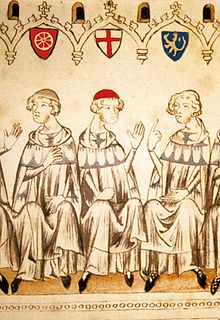Rudolf I, Duke of Bavaria
| Rudolf I "the Stammerer" | |
|---|---|
|
Duke of Bavaria Count Palatine of the Rhine |
|

The Prince-electors voting for Henry VII: Rudolf on the right, identified by the Palatinate Lion; excerpt from the Chronicle of Henry VII (Balduineum), 1341
|
|
| Reign | 2 February 1294 - 1317 |
| Predecessor | Louis II, Duke of Bavaria |
| Successor | Louis IV, Holy Roman Emperor |
| Spouse(s) | Mechtild of Nassau |
| Noble family | House of Wittelsbach |
| Father | Louis II, Duke of Bavaria |
| Mother | Matilda of Habsburg |
| Born |
4 October 1274 Basel, Prince-Bishopric of Basel |
| Died | 12 August 1319 (aged 44) Kingdom of England(?) |
| Religion | Roman Catholic |
Rudolf I of Bavaria, called "the Stammerer" (German: Rudolf der Stammler; 4 October 1274 – 12 August 1319), a member of the Wittelsbach dynasty, was Duke of Bavaria and Count Palatine of the Rhine from 1294 until 1317.
Rudolf was born in Basel, the son of Duke Louis II of Bavaria and his third wife Matilda of Habsburg, a daughter of King Rudolf I of Germany. Since the 1255 partition of the Wittelsbach territories, his father ruled over the Electoral Palatinate and in Upper Bavaria with his residence in Munich, while his younger brother Duke Henry XIII received the lands of Lower Bavaria.
As the eldest surviving son, Rudolf succeeded his father upon his death in February 1294. In September he married Mechtild of Nassau, daughter of King Adolf of Germany, thereby continuing the marriage politics of his father. However, King Adolf dashed the Princes' expectations and in 1298 was declared deposed in favour of late King Rudolf's son and heir Duke Albert of Austria. In the Battle of Göllheim, Rudolf supported his father-in-law Adolf against his maternal uncle Albert. The Habsburg duke won the fight, while the king was killed in battle.
Albert was elected on 27 July 1298 and Rudolf then joined the Habsburg party, however, the strong dynastic policy of the new king caused led to a resurgence of the Wittelsbach dynastic conflicts. In 1301 King Albert put pressure on Rudolf to accept his ambitious younger brother Louis IV, the future Holy Roman Emperor, as co-regent. He broke Rudolf's remaining resistance by laying siege to his Heidelberg residence in 1301.
...
Wikipedia
